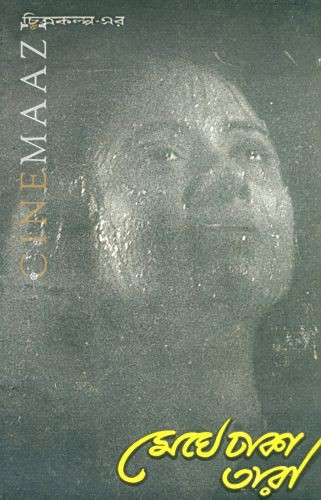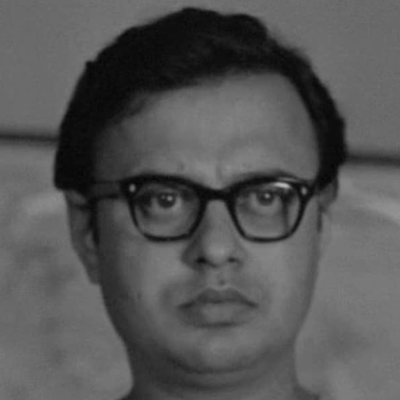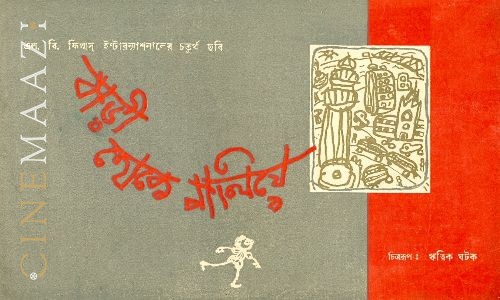This section is for paid subscribers only. Our subscription is only $3700/- for one full year.
You get unlimited access to all paid section and features on the website with this subscription.
Subscribe to read full article
This section is for paid subscribers only. Our subscription is only $37/- for one full year.
You get unlimited access to all paid section and features on the website with this subscription.
Not ready for a full subscription?
You can access this article for $2, and have it saved to your account for one year.
- Release Date14/04/1960
- GenreDrama
- FormatB-W
- LanguageBengali
- Run Time118 min
- Length3450.03 meters
- Number of Reels13
- Gauge35 mm
- Censor RatingU
- Censor Certificate Number24791
- Certificate Date22/03/1960
Neeta, her brothers Shankar and Montu and her sister Geeta live with their parents in a refugee colony, having migrated to the newly-formed West Bengal after Partition. As Neeta walks back home from tuition, her slipper breaks. She dismisses it as a minor inconvenience and continues to walk back home.
As the narrative progresses, it is revealed that Neeta’s father is a schoolmaster with a paltry income, and her eldest brother is unemployed. While Neeta, Geeta and Montu are all in college, Neeta supplements the family’s income by tutoring schoolchildren. Geeta is largely unconcerned with the problems that weigh heavily upon Neeta. Carefree, young and charmingly beautiful, she only longs for a new saree to wear to college. Neeta’s only respite from their ever growing financial strain are the letters from her childhood sweetheart Sanat. Her entire family relies on her contribution to their income, with her eldest brother Shankar often approaching her for money so he can go to the barber for a shave. Shankar is an aspiring singer, and though he is talented, he is languishing unnoticed in the village. Montu, on the other hand, is a promising athlete, and he repeatedly asks Neeta to buy him boots for football practice.
When Sanat meets the siblings in the city, he is immediately infatuated with the beautiful Geeta, who enjoys his attention a great deal. A student looking to continue his research, Sanat is strapped for money as well, and he asks Neeta to help him out. When Neeta receives her salary from her tuitions, she spends most of it on a kurta for Shankar, Montu’s boots, and Geeta’s sari. Poverty has made Neeta’s mother bitter, and she rebukes her children endlessly.
A few days on, Sanat visits their house. He tells the family that he is looking for a scholarship so he can apply for a doctorate. When he meets Neeta, her mother spies on them. She is deeply worried about their relationship: she does not want to lose the sole breadwinner in the family to marriage. To disrupt their intimacy, she sends Geeta in with a cup of tea. Soon, Neeta’s father also comes to her for money to sustain his sparing indulgence in the arts. While they speak, Neeta tells Sanat to apply for his doctorate, since she can support him once they are married and she has a steady job. Neeta tells Sanat of her dream to return to the mountains, where she once enjoyed a carefree afternoon with her brother Shankar. Sanat notices how her young, poetic self is ground down by her circumstances, and he is thrown into torment.
That night, Neeta’s father has a fall, and is bedridden, throwing the burden of the family entirely on Neeta’s shoulders. Neeta gives up on completing her Masters, and becomes one among many thronging to the city for a daily job. Sanat, meanwhile, refuses to accept job offers, continuing to study. Neeta informs Sanat that they cannot be married anytime soon, and he is made impatient and angry by this declaration.
Montu gets a job at a nearby factory, and though their father is disappointed that his educated son is employed as a labourer, his salary helps the family a great deal. When Shankar tells Neeta that he thinks the family expects too much of her, she replies that she loves them with all her heart. She hints that if Sanat truly loves her, he will wait for her. Shankar, however, is scared that she will lose herself in her service to the family.
When Sanat visits again, Neeta looks exhausted and thin. He seems ill at ease, and no longer asks her about their marriage. She leaves to tutor one of her students, and Geeta starts spending time with Sanat instead. When Neeta returns, she sees them by the pond, deep in conversation. Geeta tells Sanat to take on a job and settle down. When Shankar notices the blossoming courtship between Geeta and Sanat, he tells Neeta that Sanat is an unprincipled man, but Neeta bears this in silence. Sanat takes Geeta’s advice and accepts a job. Neeta visits him at his new flat, and she is shocked to see Geeta with him. She leaves without a word. Soon, Sanat and Geeta are married, and Geeta takes with her the family jewellery. Though their father disapproves, he sees no way out, and sinks further into depression.
Shankar takes on a job at a music school, and tells Neeta that he is leaving the house, exhorting her to finish her Masters. The two share a tender moment as Neeta asks him to teach her a song, and in Shankar’s arms, Neeta finally breaks down.
The stream of misfortune continues for their family when Montu suffers an accident at the factory. This tragedy is mixed with bittersweet relief as Montu is to receive compensation for his injury. Borne down by grief and hopelessness, their father loses his grip on sanity.
Shankar comes back home a successful singer, and he is shocked to see how ill Neeta is. He tells the family Neeta has tuberculosis, and rushes to arrange for treatment. That night, as a storm rages, Neeta’s father tells her to leave the house and be free. Feverish and delirious, Neeta walks out into the storm with her most prized possession, her photo with Shankar. Shankar runs into her and admits her to a sanatorium in Shillong.
Months later, Shankar visits her amidst the mountains. He brings her glad tidings of their prospering house, and Geeta’s mischievious son. As he speaks, Neeta cries out in agony, screaming that she too had wanted to live. She collapses weeping in his arms as her cries resound across the hills. Back in the village, a disturbed Shankar sees another girl walking home from work. Her slipper breaks, and like Neeta, she dismisses and continues to walk down the same path, limping slightly.

Cast
-
Supriya Choudhury
Neeta -
Gyanesh Mukhopadhyay
Bansi Dutta -
Bijon Bhattacharya
Taran Master -
Geeta Dey
Ma -
Geeta Ghatak
Geeta -
Dwiju Bhawal
Montu -
Niranjan Roy
Sanat -
Anil Chattopadhyay
Shankar
Crew
-
BannerChitrakalpa
-
Director
-
Producer
-
Music Director
-
Story Writer
-
Screenplay
-
Cinematography
-
Editing
-
Sound Recording/ Audiography
-
Art Director/Production Design
-
Production Controller
-
Re-recordist/ Sound Mixing









.jpg)



